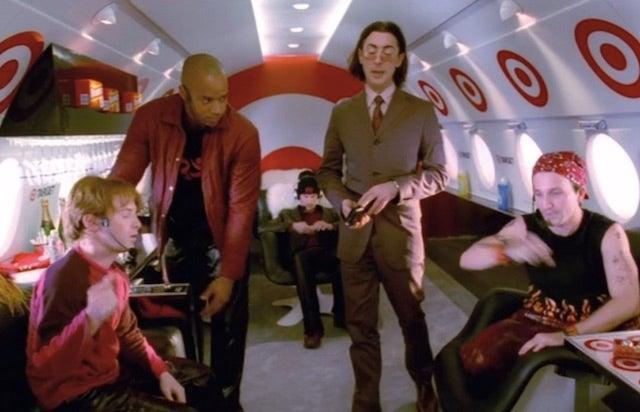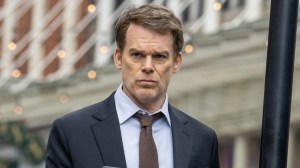Greta Gerwig’s Barbie earned $20 million in previews on Thursday night, which means before its ostensible opening night, it had already outgrossed the lifetime box office of 2001’s Josie and the Pussycats. That might seem like an arbitrary comparison, but the two films have quite a bit in common — starting with, but not limited to, an enthusiastically bright color palette. The biggest difference seems to be that, more than a decade after Josie and the Pussycats became widely accepted as an underrated gem, audiences are embracing Barbie rather than rejecting it for having a little too much pink.
Videos by ComicBook.com
Josie and the Pussycats was a 2001 film, based on the comic book and cartoon characters created by Dan DeCarlo and published by Archie Comics. Produced and distributed by Universal Pictures and MGM, the movie had a reported budget of between $22 million and $39 million, and ultimately made just $14.9 million in theaters. It went on to generate a healthy chunk of change — we don’t have exact figures, but it wasn’t trivial — on VHS and DVD, released at a time when thousands of video rental stories would feel obliged to carry at least a couple of copies of a movie with Tara Reid in it.
Despite whatever success it might have had on home video, though, Josie and the Pussycats was a punchline. The movie, bathed in pastels and glitter, was a highly visible adaptation of an existing IP, but it failed to capture the audience’s imagination.
“I think the problem was that it was marketed really badly,” star Alan Cumming told me in a 2021 interview. “I think it was marketed to young kids sort of as a tween movie, when actually it’s quite a sophisticated script, and it’s about the gags that are for meant for sophisticated older consumers. I think they didn’t know quite what to do with it, and it was marketed wrongly. And so basically the [part] of the populous it was aimed at didn’t kind of, weren’t made aware of it when it came out.”
As with Barbie, different ideas of femininity and identity were explored — although it was certainly a bit less explicitly text in Josie, and more subtext. The idea of manufactured or performative femininity was there, but it more about how the band wanted to be punk rock, not that they were thinking about conforming to gender roles. It did certainly have a lot to say about conformity — but that was more about consumerism, another theme that runs powerfully through Barbie.
While consumerism is inevitably wrapped up in the subtext of movies based on existing intellectual property (especially Barbie, who was literally a toy long before having any concrete personality traits), and the criticism of capitalism will inevitably be somewhat blunted in movies distributed by multibillion-dollar studios, both Barbie and Josie and the Pussycats definitely have Something to Say about our culture of nonstop consumption. That’s pretty rare in big blockbusters, and the Josie‘s detriment, a lot of people assumed a movie about teenage girls wasn’t “smart enough” to know what it was doing in that regard. Numerous critics at the time ignored the obvious satire in the movie and opined that its anti-consumerist commentary was misguided becuase…y’know…there were a lot of corporate logos in it.

(Filmmakers Deborah Kaplan and Harry Elfont fought to have real corporate logos included, and none of them paid to be in the movie. Some companies even heard what the premise was and explicitly forbade the filmmakers from using their logos.)
It’s also difficult to argue that the movie being aggressively marketed to girls and young women didn’t hurt it at the time. Nowadays, you will find more men willing to go see a movie like Barbie — even if it has to be wrapped up in irony, like an Oppenheimer double feature — but in 2001, cinema was much more gendered than we think of it now.
“I’ve always had a lot more female friends than male friends, and so I’ve always been able to appreciate the line-in-the-sand division of how there are the occasional films that are allowed to be welcomed into the boys’ club of movies,” Mo Shafeek, longtime head of Mondo’s record label, told me. “Things like Clueless, or Mean Girls or Bridesmaids, cross over, and they star women or they’re directed by women, but we’re like ‘those are good movies.’ There’s just a handful of movies that are allowed to cross over into the male sphere as being acceptable. But by and large, there are so many other movies that don’t.”
About five months after Josie and the Pussycats opened in theaters, it made its way to VHS and DVD. In a 2021 book about Josie and the Pussycats, Bendis revealed that he had moved across the country, only to wake up in an empty house — his furniture had not yet been delivered — to the news that two commercial jets had crashed into the World Trade Center. After buying a small television and spending a couple of days getting overloaded with bad news, Bendis said he bought a copy of Josie and the Pussycats on a whim, thinking he needed a mental break from tragedy. He said he fell immediately in love with the movie, and wrote about it in the letter column for Powers. In the book, some Josie fans pegged Bendis’s recommendation as the moment they decided to give the movie a try.
“It’s really interesting to hear you say that a bunch of dudes suddenly watched it because Brian Bendis was like, ‘It’s good, actually,’ and they were like, ‘Oh, wow.’ I think that happens a lot,” Sam Maggs, author of Wonder Women: 25 Innovators, Inventors, and Trailblazers Who Changed History, told me. “I write about fan culture, and especially about fangirls, and just the nature of the name “fangirl” is so derogatory, and implies like a lack of sense and logic, and that fangirls are all like hysterical, and silly, and the things they like aren’t worth really looking at….It is frustrating, because it’s like we shouldn’t have to wait around. You should respect the women in these spaces enough to listen to them. When they say that something is meaningful, or good, or culturally impactful – you’re allowed to like, or not like, whatever you want, but it’s a problem when you start to say ‘This is not impactful and has no meaning culturally, from an objective standpoint,’ because stuff like that just isn’t true, because obviously this movie touched a whole lot of women – and guys, but especially women – of this age, and the music and the film, and its message, remains really meaningful.”
Barbie is in theaters now. Josie and the Pussycats is available to buy on DVD, Blu-ray, and Digital. You can catch regular airings of it on Starz Kids right now, which is a whole other conversation in and of itself.








